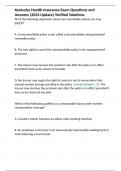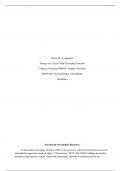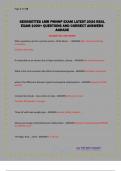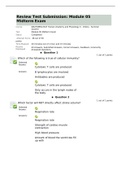Preview 3 out of 10 Flashcards
The benefits of buying summaries with Stuvia:

Guaranteed quality through customer reviews
Stuvia customers have reviewed more than 700,000 summaries. This how you know that you are buying the best documents.

Quick and easy check-out
You can quickly pay through credit card or Stuvia-credit for the summaries. There is no membership needed.

Focus on what matters
Your fellow students write the study notes themselves, which is why the documents are always reliable and up-to-date. This ensures you quickly get to the core!
Frequently asked questions
What do I get when I buy this document?
You get a PDF, available immediately after your purchase. The purchased document is accessible anytime, anywhere and indefinitely through your profile.
Satisfaction guarantee: how does it work?
Our satisfaction guarantee ensures that you always find a study document that suits you well. You fill out a form, and our customer service team takes care of the rest.
Who am I buying these notes from?
Stuvia is a marketplace, so you are not buying this document from us, but from seller PERFECTGRADES. Stuvia facilitates payment to the seller.
Will I be stuck with a subscription?
No, you only buy these notes for $5.99. You're not tied to anything after your purchase.
Can Stuvia be trusted?
4.6 stars on Google & Trustpilot (+1000 reviews)
63950 documents were sold in the last 30 days
Founded in 2010, the go-to place to buy study notes for 15 years now
Recently viewed by you

Exam (elaborations) ·
Skills Module 3.0. Learning Modules- Skills Module 3.0- Enteral Tube Feeding Posttest

Package deal ·
Fysiotherapie Minor Musculoskeletaal BUNDEL - Samenvattingen van ALLE theorietoetsen

Exam (elaborations) ·
Kentucky Health Insurance Exam Questions and Answers (2024 Update) Verified Solutions

Other ·
NRNP 6645 Module 3 Week 10 Assignment, Therapy for Clients With Personality Disorder

Other ·
Tabelle der Prüfungspflanzenliste, krautige Pflanzen und Gehölze, Pflanzenökologie II

Exam (elaborations) ·
GEORGETTES LMR PMHNP EXAM LATEST 2024 REAL EXAM 1000+ QUESTIONS AND CORRECT ANSWERS AGRADE

Exam (elaborations) ·
American Government, Abernathy - Complete Test test bank - exam questions - quizzes (updated 2022)

Summary ·
Volledige samenvatting management in de strafrechtsbedeling (incl. gastcolleges)

